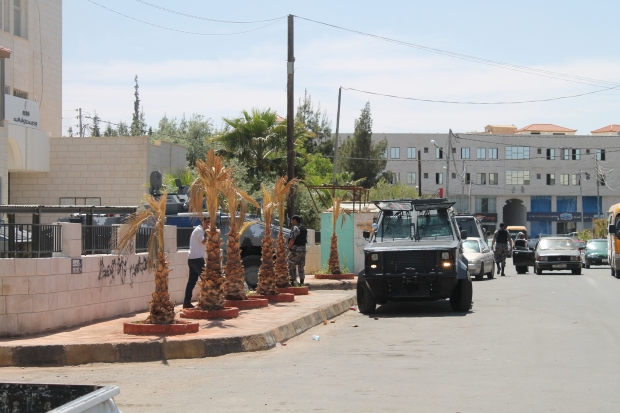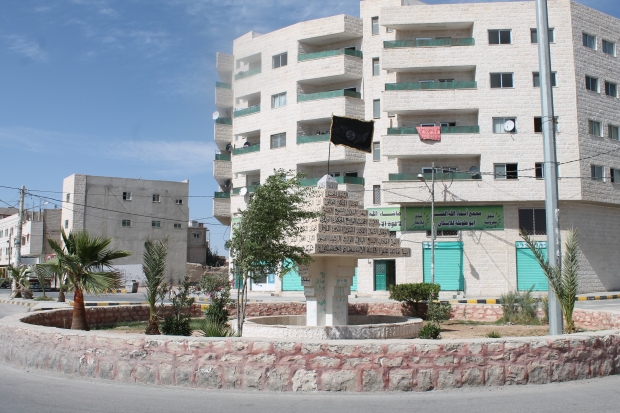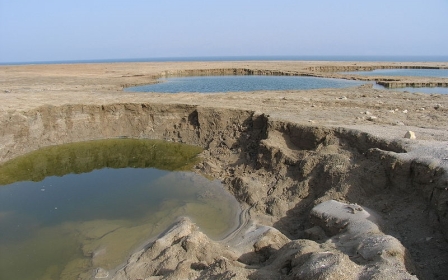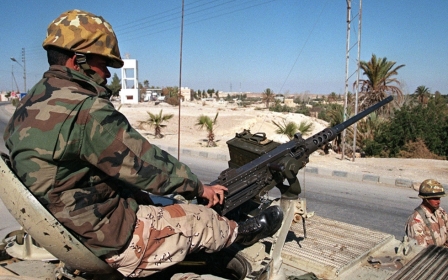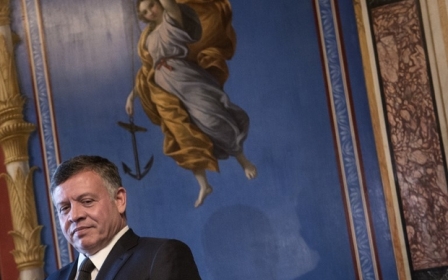Exclusion, not extremism, fuels tensions in Jordan’s south
After a stormy week of civil unrest, allegations of police violence, assaults on government buildings, at least 16 arrests and the death of a 19-year-old named Qusai, an uneasy calm has returned to the streets of Ma’an.
Jordan’s southern city of Ma’an has a long history of anti-establishment protests and associated crackdowns. Its current crisis began in late April, when Qusai al-Imami was shot and killed, allegedly by Darak security forces – Jordanian riot troops –searching for criminal elements.
The following day, locals reported gunfire and anti-government demonstrations, with young men setting tyres alight in the streets to block off roads and hamper police access.
By Friday 25 April, demonstrations were, bigger, louder, and marked by jihadist flags and slogans. Authorities reacted swiftly, rooting out the men they believe were responsible for the unrest.
On Monday 28 April, officials said police had arrested 16 youths suspected of involvement in armed attacks against government buildings.
When Middle East Eye visited Ma’an the following day, the streets were calm and four heavyweight anti-riot Dahak vehicles were on guard in front of the courthouse. Officers in body armour vests and military fatigues, smiled and offered directions to the police station.
But down the road from the main market street, angry young men, who said they were unemployed, were eager to talk about their perceived mistreatment by the state and the excessive force they say was used to end the life of their cousin and friend, 19-year-old Qusai.
On the way to Qusai’s family home, the group insisted on taking a detour past a nearby roundabout, where the black flag of Tawheed still flew.
“We raised it,” says Musab Tahan, a tall, solidly built 20-year-old with a bushy beard and pale, arresting eyes.
In worn camouflage trousers, his sandaled feet caked with dirt, Tahan carried authority on the streets of Ma’an. When Tahan spoke, the men around him draw close.
“We’re Muslim, and it’s a Muslim’s flag,” he says almost matter-of-factly, even though the authorities and the media have been in a flutter about it flying over Ma’an.
Ma’an’s misfortunes: More economics than religion
The dust may have settled for now, but tensions remain in this isolated city of 50,000, which rests nearly 200km south of the capital Amman.
Ma’an has an unemployment rate of at least 20 percent, which is almost double the national rate. While most of the town’s young people are relatively well educated, and many are graduates of the town’s Al-Hussein Bin Talal University, far fewer than the national average go on to join the workforce.
“At any time just a third of Ma’anis are here - the other two thirds are in other cities looking for jobs,” says Malik AbdehRahman Drorog, a 35-year-old university employee and a friend of the Imami family. “Unemployment is the main cause of our problems.”
Like much of the Arab world, Jordan suffers from chronic youth unemployment, which has been be exasperated by decades of government bureaucracy and poor economic management. While Jordan has tried to root out stifling business practices and diversify its economy, it remains dependent on generous foreign aid and has been rocked by the reverberations from the Arab Spring.
“Ma’an’s troubles aren’t new,” says Sean Yom, a political science professor at Temple University in Philadelphia and a widely published expert on Jordanian tribal politics.
“Since the time of British colonisation, Ma’an tribes have generally been more politically disconnected and economically marginalised than most other East Bank communities. And that marginalisation in Ma’an has an edge to it.”
Ma’an’s relationship with central Jordanian politics became markedly more strained in 1989, when the city experienced intense rioting, gun battles and anti-austerity demonstrations. Scores were killed, and anti-establishment protesters raised the Saudi flag at several points in the city.
The sense of resentment and isolation seems to runs deep within the community. Mohammed al-Tawarh, a 41-year-old former air force officer, who owns the bakery across from the courthouse, says he believes citizens are getting a bad deal economically so that Jordan can advance its geo-political interests, especially its relationship with the US.
“We’re like people in a hospital,” he says. “We can survive but we’re not getting stronger.”
Tawarh believes nepotism and corruption are to blame for his city’s woes.
“The son of a minister becomes a minister, the son of a manager becomes a manager, the son of a police officer becomes a police officer, and the son of a farmer becomes a farmer,” he says.
“The two feet of the regime are the army and the tribes. Tribal thinking is stronger than any other thinking here. There’s no room for other loyalties.”
Jordan is a deeply tribal society, with tribal differences occasionally flaring up into violence, but Ma’an is considered to be particularly tribal.
"Notions of collective identity and unified values carry more weight among tribal communities found in southern rural governorates like Ma'an than within the upwardly mobile East Bankers of Amman," says Yom.
But while economics and tribal politics have knit together to create a backdrop of disenfranchisement, this isn’t the whole story.
Ma’an has a significant Salafist element that is of concern to a government that’s working hard to keep Jordan stable and secure.
“Ma’an has become a major centre of Salafist recruitment,” says Yom, who estimates that of 15,000 Salafis in Jordan, between 2,000 and 3,000 are jihadists.
Others have put the figure even higher. Ayman Khalil, the Amman-based Director of the Arab Institute for Security Studies, thinks 15,000 might be low.
“The number could be significantly higher if you consider the sympathetic audience, which is a silent constituency,” says Khalil.
“This audience has similar beliefs and values, yet they differ on approaches and tactics. There is a spectrum of Salafis in Jordan. It includes Dawa Salafis, dialogue Salafis and extends all the way to jihadi Salafis and the most extreme track of takfiri Salafis”.
A report published this week by the Washington Institute think tank says Salafis on the jihadist end of this spectrum are gaining ground in Jordan. In particular, it cites an example of one tribal leader in Ma’an, pledging allegiance to the emir of the Islamic State of Iraq and al-Sham (ISIS), the hardline militia group fighting in Syria and Iraq which has recently been disavowed by al-Qaeda.
But in Ma’an, Tawarh, who agrees there is a sizeable and active Salafist presence, and even suggests Qusai was targeted by police for his “Salafist look”, insists there is no threat of jihadist elements gaining any meaningful traction.
“ISIS couldn’t intervene here. It’s too tribal, and there’s no reason for them to be here,” he says the former air force officer, turn baker.
From this perspective, Tawarh wonders why the jihadist-infused panic and horrified reaction that played out on social and mainstream media was so swift.
“This wasn’t the first time this flag was raised, but it’s the first time it got this attention,” says Tawarh.
The attention may be a matter of timing: security is centre stage right now in Jordan. Against the backdrop of the Syrian war, increasing sectarian tensions around the region– notably in Iraq and Lebanon – and Jordan’s well-documented efforts to keep jihadism and associated violence out of the Hashemite Kingdom the appearance of the black jihad flag would be, as it were, a red flag.
“The Salafist trend brings with it a securitisation, and security operations inevitably kill innocent citizens, whether they are bystanders or wrong targets,” says Yom, who blames the heavyweight police reaction for the situation spinning out of control.
“When you look for a fight, bad things are going to happen," Yom adds.
One family’s bad luck, a whole town’s woes
Qusai’s friends and family allege that his death was one just one of those bad things. His cousin Hassan al-Imami, 22, says Qusai was coming back from the mosque when he was shot: “They say he was resisting arrest.”
To date, the government has neither confirmed nor denied the cause of the Qusai’s death. A statement issued by the Security Department said police exchanged gunfire with people blocking the road during a hunt for wanted people. Both the police and the security services declined to comment for this article.
Qusai’s father, Suleiman Ahmed Khalil Imam, says his son had not been wanted by the police.
“My son was very devout, but he was not a Salafist,” he says, while explaining that he believes his son was targeted for the way he looked.
“The police go after people here. Sons of Ma’an have repeatedly been killed. Qusai is not the first,” he added.
Adam Coogle, an Amman-based Middle East researcher at Human Rights Watch, says it’s difficult to piece together what happened that day.
“But given the history of police responses to violence in Jordan and the culture of impunity, regardless of whether or not force was excessive, chances are we will never see an investigation or any scrutiny of the officers involved,” Coogle says.
Qusai’s father rejects the suggestion that national security fears around the spread of jihadism and a spillover of the violence that has come to define Syria’s civil war might be behind police actions that day.
“This has nothing to do with Syria,” scoffs Al Imami. “When you raise this flag, the world thinks you are a terrorist.”
Like Tawarh, he also rejects the suggestion that there is room for al-Qaeda, ISIS and jihadism in Ma’an. The 14 men seated around his living room, at least two who say they raised the flag themselves, concur with a chorus of “La”, tongue clicks, muttering and head shakes: Arabic for “absolutely not”.
“If al-Qaeda had any relation here, you’d see bombs everywhere,” says Al Imami adds.
“This propaganda about extremism taking hold in Ma’an has been going around since 1989. Our problems are poverty and unemployment. Unemployed young men have to have problems. If there were jobs, there wouldn’t be any problems.”
The men suggest the flag was raised as a statement – an aggressively anti-authority message from them to the apparatuses they believe are keeping them down. They wanted to provoke, and on a large scale: no one, they say, is getting the message.
Coogle agrees the flag has been used by anti-establishment elements in Ma’an long enough that locally, it may have become associated with that of a rallying cry versus a call to jihad. “This may be a case of it being used as a flag of protest,” he says.
Qusai’s father believes his son, and indeed his whole family, had grounds for protest. At the time of his death, Qusai had just completed a three month training programme to learn a trade and start work. But a month after the programme ended, Qusai and the 149 other young men who completed the course still had no jobs.
Al Imami cites other examples of what he sees as Ma’an’s economic disenfranchisement, like the closure of various local projects, including a hospital. While he acknowledges that locals play a role in the conflict with national authorities – admitting that Ma’an residents are highly armed – he says he has little hope that Ma’an’s relationship with the Jordanian centre will change anytime soon.
“Our problem is not with the King, but with the government. And the government has persecuted Ma’an since 1989,” Al Imami adds.
He’s equally unconvinced he will ever get justice for his son’s death.
“I want any man from the government who does bad things in front of the court. I want justice,” he says. “Especially from the Interior Minister and the Police Chief in Ma’an.”
Human Rights Watch’s Coogle doesn’t think this is likely to happen. “Police as a whole do not launch an investigation unless a formal complaint is lodged – and that’s an onerous, black box of a process that involves finding a police prosecutor. So for this reason, most people don’t do it.”
“We’re often told, when we ask police about events where we believe excessive force was used, that nothing bad happened. Why? Because no one filed a complaint.”
Al Imami says a committee for justice has been formed and is looking into Qusai’s death, but has not yet had any results.
Coogle is unsurprised. “There is a culture of impunity in Jordan. Justice tends to only come when things are raised to a political level – and that takes social outrage.”
Middle East Eye propose une couverture et une analyse indépendantes et incomparables du Moyen-Orient, de l’Afrique du Nord et d’autres régions du monde. Pour en savoir plus sur la reprise de ce contenu et les frais qui s’appliquent, veuillez remplir ce formulaire [en anglais]. Pour en savoir plus sur MEE, cliquez ici [en anglais].


